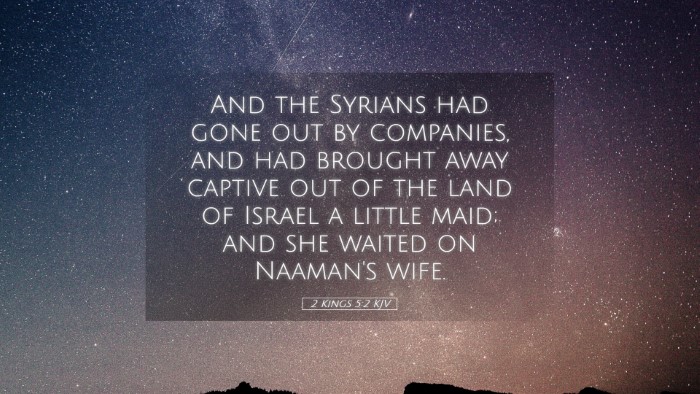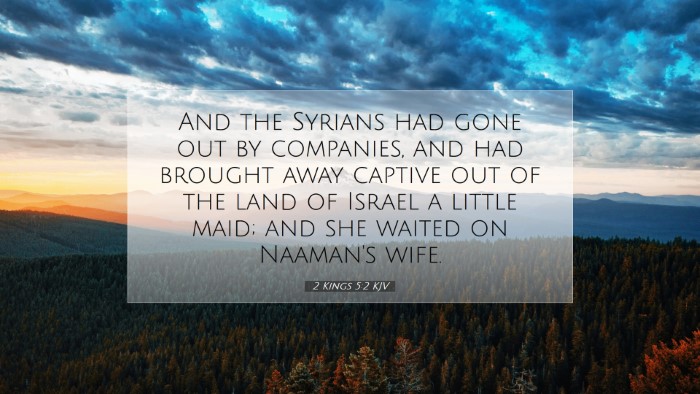Commentary on 2 Kings 5:2
2 Kings 5:2 states: "And the Syrians had gone out by companies, and had brought away captive out of the land of Israel a little maid; and she waited on Naaman's wife."
Introduction
In this brief yet pivotal verse, we are introduced to a key character in the narrative of Naaman, a commander of the Syrian army. The verse sets the stage for a story that unfolds themes of faith, healing, and divine providence. The capture of a young Israelite girl and her role in influencing the life of Naaman highlights the unexpected ways God works through seemingly ordinary events.
Contextual Background
The historical context of this passage is significant. The relationship between Israel and Syria during this period was tense, characterized by military skirmishes and territorial disputes. The mention of the "little maid" serves to illustrate not only the vulnerability of Israel during this time but also the greater narrative of redemption and divine intervention that unfolds through her actions.
Insights from Matthew Henry
According to Matthew Henry, the capture of the maid represents God's mysterious providence. He suggests that God's people may often find themselves in circumstances that appear unfavorable, yet these situations can lead to significant outcomes. The maid's captivity was a means by which God would work for Naaman's healing. Henry emphasizes the faith and courage of the young maid, who despite her dire circumstances, maintained a perspective of hope and service.
Insights from Albert Barnes
Albert Barnes provides a detailed analysis of the societal implications of this verse. He points out that the maid, being taken captive, highlights the reality of war and its cruel consequence on innocent lives. Barnes notes that her willingness to speak of the prophet Elisha indicates her own faith in God and His ability to heal. This underscores a critical theological point: God often uses those who seem powerless in society to bring about His purposes.
Insights from Adam Clarke
Adam Clarke reflects on the character of Naaman and the implications of his encounter with the maid. He comments on the irony of a great warrior, revered for his military prowess, being reliant on the words of a young, slave girl for healing. Clarke emphasizes that God’s grace can be revealed through the most unlikely vessels and circumstances. The maid’s influence over Naaman’s fate serves as a reminder to maintain humility and openness to God’s leading, regardless of one’s status or position.
Theological Reflections
- Divine Providence: The verse serves as a reminder that God is at work in all circumstances, often in ways beyond human understanding.
- The Power of Faith: The young maid's declaration about the prophet Elisha showcases the significance of faith in initiating divine interventions.
- God’s Use of the Humble: The story illustrates that God often chooses to work through those who are marginalized or appear powerless.
Application for Modern Readers
This passage encourages contemporary readers to reflect on how God may be positioning them in their circumstances to affect change or bring hope to others. It invites believers to consider their responses in challenging situations and the potential impact of their faith on those around them. Moreover, the call to action is evident: trust in God’s salvation story, which often unfolds in unexpected ways.
Conclusion
In conclusion, 2 Kings 5:2 encapsulates a powerful story that begins with an ordinary circumstance—captivity leading to healing. The insights from various public domain commentaries enrich our understanding, emphasizing themes of faith, divine intervention, and providence. It serves as a powerful reminder that God’s plans often include the voices of the seemingly powerless, working through their faith to accomplish His sovereign purposes.


